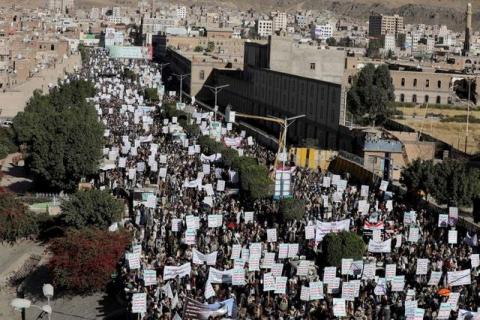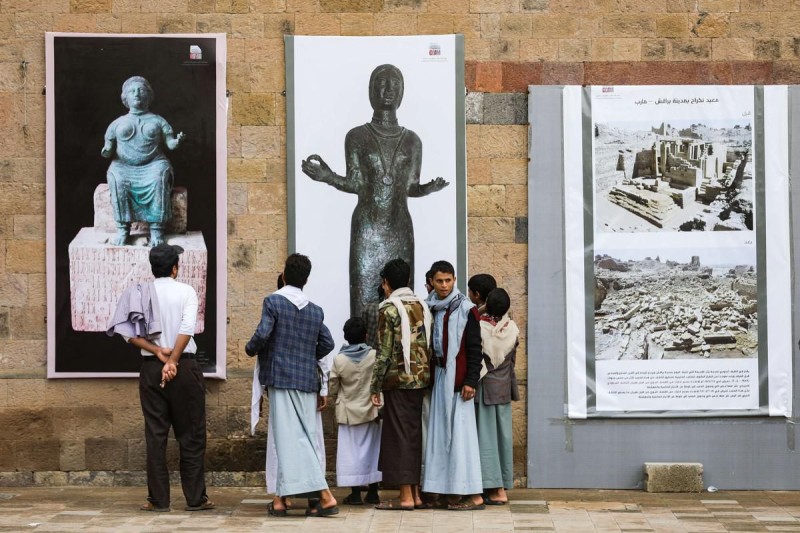Devaluation of national currency multiplies people's woes in war-ravaged Yemen


Yemen's national currency continues to depreciate and has reached the lowest against the U.S. dollar in the black market since a civil war broke out more than five years ago, causing more damage to the ordinary people and multiplying their woes.
In the country's southern port city of Aden, the Yemeni riyal is traded in the black market at 900 for one dollar, the lowest exchange rate since the beginning of the military conflict between Yemen's government and Houthi rebels.
At the beginning of 2020, the Yemeni riyal was traded 625 and then continued to fall reaching 690 over the past five months. Before the eruption of the civil war in January 2015, the riyal was 215 to one dollar.
The sharp decline in the Yemeni currency's value started to severely affect the people who are already coping with the deteriorated situation caused by the years-long war.
Many Yemeni people said that the currency's devaluation dramatically increased their economic hardships particularly with the skyrocketing prices of food items and other basic commodities.
"The recent fall of the national currency complicated my family's life and made me unable to buy the basic daily needs to survive," Gihad Saleh, an Aden-based citizen, told Xinhua.
Gihad who works as a taxi driver in Aden's neighborhood of Mansourah said that many families survived years-long violence and war bombardment but the recent unprecedented currency depreciation will affect everyone.
"Many poverty-stricken families are jut victims of the recent economic situation that is continuing to starve the Yemeni people," he said, adding that "the recent situation is unbearable."
In a bid to curb the significant deterioration of the Yemeni riyal against foreign currencies, the Aden-based central bank took a number of measures including closing around 30 private exchange facilities for violating the financial rules.
But the Central Bank's measures achieved no effect on the market as the Yemeni riyal continued devaluating and despite suspending the exchange operations in the government-controlled provinces.
Some Yemeni people angrily expressed their resentment against the worsening situation and called the Saudi Arabia-led coalition to intervene economically to curb the currency's dramatic fall.
"We as citizens do not care much about the military achievements in the ongoing conflict because preventing our economy from collapsing is a great victory for everyone," said Baseem Ahmed, a private company employee in Aden.
"The majority of Yemen's people are now waiting to receive an economic support from the regional and international countries because they're already got fed up with weapons," said Baseem.
He added that "the priority now is to save Yemenis from famine caused by the recent currency's devaluation and skyrocketing prices of food items."
Last Tuesday, the United Nations World Food Program (WFP) in Yemen warned the riyal had lost 250 percent of its value since the start of the war in 2015, which has led to an increase in food prices by 140 percent.
In 2017, the Yemeni government floated the national currency in a move that economic observers and analysts said was not well-studied a year after the relocation of the Central Bank to Aden.
The Yemeni economy is continuing to suffer after all exports were halted following a blockade on the country which was part of a Saudi-led military intervention in March 2015. The blockade has also restricted imports largely.
All investments including oil and gas projects, whose revenues used to contribute more than 70 percent of the state budget, were shut down.
Flow of foreign cash has stopped almost completely and widespread corruption within the government institutions is among problems deepening economic misery.

Sana’a – The General Authority for Antiquities and Museums, operating under the control of the Houthi militia in the occupied capital S…

Hadramout — UNESCO has officially inscribed Al-Dan Hadrami, a traditional poetic and musical art form from Yemen’s Hadramawt region, on…

NewYourk  -- The renowned auction house Sotheby’s has revealed plans to present one of the rarest surviving Yemenite Torah scrolls in it…